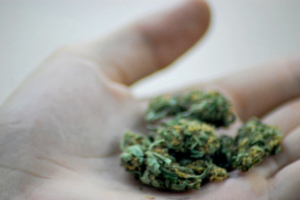 Due to the controversy regarding whether marijuana truly causes addiction or not, there is limited information available regarding marijuana addiction. It is clear that marijuana has many benefits when used for medical purposes, but it also has dangers when abused. Researchers know that when marijuana used over a long period of time causes tolerance, dependence, and addiction.
Due to the controversy regarding whether marijuana truly causes addiction or not, there is limited information available regarding marijuana addiction. It is clear that marijuana has many benefits when used for medical purposes, but it also has dangers when abused. Researchers know that when marijuana used over a long period of time causes tolerance, dependence, and addiction.
Marijuana it usually smoked to produce a euphoric and relaxed effect, but many people eat the substance for a longer, milder high. However it is taken, a person runs the risk of feeling the need to use marijuana every day and being unable to stop daily use without help. Many experts say marijuana causes adverse effects both psychologically and physically while others believe that the drug has no addictive properties at all.
Physical Signs of Marijuana Addiction
The physical signs and symptoms of marijuana addiction include:
- Changes in appetite
- Increased heart rate
- Changes in mood
Psychological Signs of Marijuana Addiction
The psychological signs and symptoms of marijuana addiction include:
- Increased anxiety and paranoia
- Depression
- Reduced ability to think clearly
Risks associated with Marijuana Use
Persistent, daily use of marijuana can lead to increased risk for:
- Heart attack
- Cardiovascular vulnerabilities
- Pneumonia
- Lung cancer
Addictive Potential of Marijuana
 Long-term use of marijuana produces addictive potential, according to research by the National Institute on Drug Abuse (NIDA). Most first-time and occasional users who smoke pot recreationally will not become addicted to marijuana. However, daily use of this drug leads to many harmful effects. Abruptly ceasing use of marijuana after a prolonged phase of daily use leads to agitation, irritability, insomnia, poor appetite, cravings, and mood swings.
Long-term use of marijuana produces addictive potential, according to research by the National Institute on Drug Abuse (NIDA). Most first-time and occasional users who smoke pot recreationally will not become addicted to marijuana. However, daily use of this drug leads to many harmful effects. Abruptly ceasing use of marijuana after a prolonged phase of daily use leads to agitation, irritability, insomnia, poor appetite, cravings, and mood swings.
Most of the symptoms associated with marijuana withdrawal usually peak around the 3rd or 4th day after stopping the drug. Within a couple of weeks, all symptoms of marijuana addiction have gone away, but some of these symptoms last for a long time. The mental effects include lack of desire to be social, feeling people are out to get you, acute psychotic reactions, having a depressed state, and anxiety that is persistent.
Signs of Marijuana Addiction
The first step to overcoming any drug addiction is to acknowledge that you have a problem and require help. Identifying the signs of marijuana addiction will allow you to determine the severity of your addiction. Cannabis dependence is much more common than addiction to other drugs due to the number of people using marijuana, according to the U.S. National Library of Medicine. Some marijuana addiction signs include:
- Withdrawal when marijuana is not smoked – If you suffer from withdrawal (upset stomach, anxiety, and/or depression) when you do not have marijuana in your body, then you have developed physical dependence.
- Tolerance to marijuana – Having to smoke more marijuana to produce the same effects, means you are becoming addicted.
- Inability to cut down or control marijuana use – Cutting back on your smoking or using less but you still wind up smoking more or using more.
- Smoking more pot than you intended – Telling yourself or others that you will only smoke once a day, but you end up smoking several times in one day.
- Spending most of your time looking for pot or getting high – Marijuana takes over your life to the point that you spend so much time getting high and do not take part in other activities.
- Using pot to relax and relying on it for relaxation – Smoking marijuana to relax and becoming dependent on the drug to relax.
- Continuing to smoke pot despite of consequences – Suffering negative consequences from smoking pot, such as getting arrested.
- Reduced social, school, and work activities – All of your time is focused on obtaining and smoking marijuana that you no longer enjoy life.
Statistics on Marijuana Addiction
- Around 10% of people who smoke pot become addicted to it.
- 17% of teens and young adults experience withdrawal when they stop using marijuana.
- 13% of people continue to smoke pot even though they have health problems related to use.
- Brain abnormalities have been found in young adults who smoke pot at least once a week.
- Regular marijuana smokers have a 6-point decline in IQ over time.
- Marijuana users are 4 times more likely to suffer from depression.
Resources
Gilman, J. M., Kuster, J. K., Lee, S., Lee, M. J., et al., Cannabis use is quantitatively associated with nucleus accumbens and amygdala abnormalities in young adult recreational users. J Neurosci, 2014. 34(16): p. 5529-38.
Meier, M. H., Caspi, A., Ambler, A., Harrington, H., et al., Persistent cannabis users show neuropsychological decline from childhood to midlife. Proc Natl Acad Sci U S A, 2012. 109(40): p. E2657-64.
Nocon, A., Wittchen, H. U., Pfister, H., Zimmermann, P., et al., Dependence symptoms in young cannabis users? A prospective epidemiological study. J Psychiatr Res, 2006. 40(5): p. 394-403.
